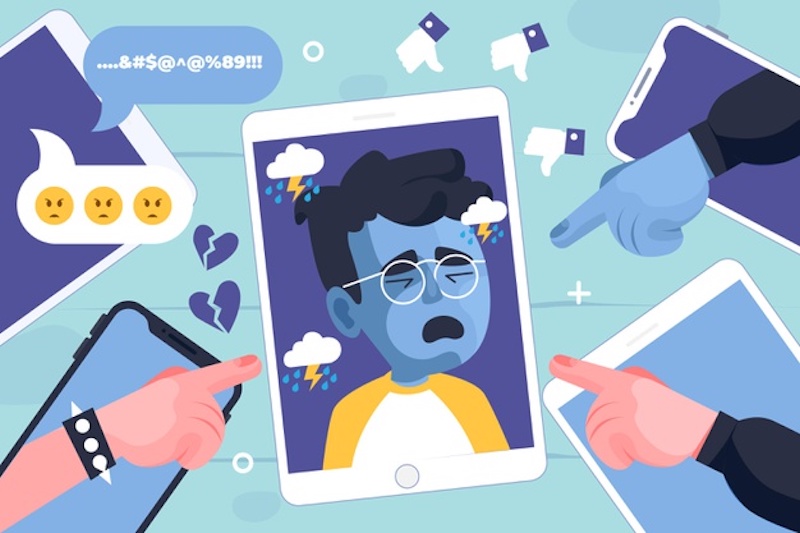On the agree side, I still stand by my point. Cellphones should be banned in the classroom. Besides the few reasons that have been elaborated on during the debate, as Breanna (2019) mentioned, she has noticed in her own classroom that students have become increasingly dependent on their phones, and students are dealing with nomophobia, the fear of not being able to use one’s phone or the many apps that these devices now offer. This phenomenon leads to other issues including the inability to focus, stress and anxiety, and the inappropriate use of cellular devices.
Nomophobia & FOMO
How many of you are attempted to check your phone, like text, social media notification, etc., during your work or study? How many of you are felt empty or missing something when your phone is not around? How many of you are felt fear of missing out (FOMO) important notifications? I certainly do. I start questions myself: are they really important?

Similar to students, they need to mature enough to control the urge to compulsively check their phones (Smale et al., 2021). As the whole new generation was born into the digital world while growing up, technology is natural for them. Their brain is constantly seeking information. To ban cell phones in the classroom, we will reduce the seven or eight hours that students will have on their phones and let them focus on what they need to focus on. There is no doubt that the notorious dependence of children on their mobile devices is a problem, that why the strict rule of banning cell phones need to be implemented in classrooms.
Cyberbullying & “Sexting”
During the debate, we have not had too much time to elaborate on cyberbullying and sexting. They are also part of the reasons why cell phones need to be banned in the classroom. In the context of cyberbullying, the cell phone is a “potentially offensive weapon. More recent studies reported that children who owned cell phones in Grades 3 to 5 were more likely to be both victims and perpetrators of cyberbullying compared to those who did not own cell phones. Cell phones in classrooms could contribute to increases in written and verbal threats due to these devices’ inconspicuous nature, especially when cyberbullying is compared to more traditional, overt forms of bullying (Smale et al., 2021). Banning cell phones is one of the methods that could help reduce cyberbullying and stop it at the school gate.

Related to cell phones, there is an ever-growing prominence of students’ use of cell phones to engage in “sexting.” “Sexting” is defined as the “self-production and distribution by cell phone of sexually explicit images in the course of
consensual, voluntary activity.” 48% of the youth had received sexually suggestive text messages, 31% had received nude or semi-nude photographs or videos, 38% had sent or posted sexually suggestive text messages, and 20% had sent or posted semi-nude photographs or videos (Smale et al., 2021). Banning cell phones can stop students photographing and then texting images of their peers without their permission.

Surveillance Capitalism
I mentioned surveillance capitalism in the opening debate statement video. The ban on phones in school will effectively limit the data collected on children by not allowing them to use their personal devices during school hours (Selwyn & Aagaard, 2021). Surveillance capitalism refers to the collection and appropriation of device users’ personal data by third parties such as advertisers, data brokers and other beneficiaries of the so-called “data economy” (Holloway, 2019). Phone bans will significantly disrupt students’ exploitation by commercial data brokers, stop relentless tracking of and marketing to children, and avoid excessive commercial incursions into classrooms.

Changing Mindset
I can see the benefits of allowing cell phones in classrooms from the disagreed side, such as increasing accessibility, improving the connection between teachers and students, students and students, and students and parents, engaging in learning, interacting with students etc. There are many successful examples of integrating cell phones in the classroom. For example, Kunnath and Jackson (2019) research about incorporating Twitter into the class to implement critical literacy. Students and teachers utilized their cell phones inside and outside of the classroom to access Twitter for purposes of research, communication, and interaction.
To not ban cell phone in the classroom, teachers need to change their mindset and design curriculum to incorporate these devices in class, update school policies and classroom expectations to reduce distractions, provide guidance and supports towards cyberbullying and sexting, and find ways to use phones as academic tools.
8 Comments
Dami Ogundipe
Hi Echo, your concerns about the dangers of having cell phones in the classroom are valid. Even though there seems to be some positivity to it, the cons outweigh the pros significantly. I worry more about how it affects students cognitively as they are more dependent on getting their answers technologically without even attempting to do some thinking of their own. How do they remember definitions or things they ought to know off-hand during test/examination period when all they have ever done is rely on their ever-available technological device? There are other ways to achieve digital literacy in the classroom without encouraging the use of cell phones in the classroom. Nice write up!
Echo
Hi Dami,
Thank you for reading my blog. Good points! Students might become too dependent on technology without thinking about the question thoroughly. Not only has technology affected children cognitively but also affects adults. With the help of Google, I also become too dependent on search results from Google and get quick answers. Technology has saved our time, but some of our cognitive abilities might degrade, like memorizing abilities.
Echo
Amanpreet
Hi Echo, I liked the way how you have presented the drawbacks of using cellphones. Its an easy way to read and know the disadvantages of using cellphones in a classroom.
Nomophobia is a big concern and it is not among only kids but it happens with adults too. I also miss my phone when its on charging and sometimes I put it off from charging and start using it.
I think we are not using cellphones but cellphones are using us.
Echo
Hi Amanpreet,
Thank you for reading my blog. I agree with you that nomophobia also affects adults. The first thing I woke up was to find my phone. I remember this morning, I couldn’t find my phone, I become very anxious and fear of missing out (FOMO) important message or notification, but when I found my phone, there was nothing in there. I laugh at myself, and at the same time, I feel cell phones are an integral part of our daily life. Adults have more control over themselves, but children have not developed this skill enough yet. Having cell phones in the classroom would worsen the nomophobia and FOMO phenomena.
Echo
Arkin
You mentioned cyberbullying and sexting as reasons why cell phones need to be banned in the classroom. I agree that these issues can cause a course of problems for students in the classroom, and eliminating cell phones may decrease the stats on this. However, many of these issues are not happening with using cell phones in class but after school hours. This makes discipline a little tricky because it is not school-related, yet it directly impacts the school and students. While teachers need to find ways to ensure the cell phone is used as an educational tool, I think parents need to step up and teach their children guidelines, set boundaries, and clear expectations. Cell phone addiction starts at home, so for cell phones to be implemented in the classroom, a strong relationship is needed between the parents and teachers to set clear and reasonable guidelines.
Echo
Hi Arkin,
Thank you for commenting on my blog! Students probably even more addicted to cell phones after school hours if cell phones are banned in the classroom. What you have said intrigues me thinking of revenge spending after COVID-19. It defines as people engaging in revenge spending when they spend lavishly following a negative event. During the pandemic, people have been locked at home. When stay-at-home orders were lifted and businesses opened their doors to the public again, many of us spend more money compared with the times before COVID-19. The consumption patterns have been completely changed. A similar idea could be applied to banning cell phones in the classroom. Students may use more cell phones after school hours or at home because their usage of cell phones has been constrained in the classroom.
Echo
Fasiha Taha
A very thoughtful post Echo, I really like it. Yes, I agree with your point of changing the mindset of teachers so that they can design curricula in such a way that devices can be incorporated into the lesson in the classroom. The problem of cyberbullying and sexting is one of the major problems that our generation is facing. Guidance and support are needed by our generation in these areas. So that cellphones can be used as an academic tool in our school.
Echo
Hi Fasiha,
Thank you for reading my blog. I feel more support from schools might be beneficial for designing a curriculum that incorporates digital devices into teaching. Guidance and supports from schools are also important.
Echo